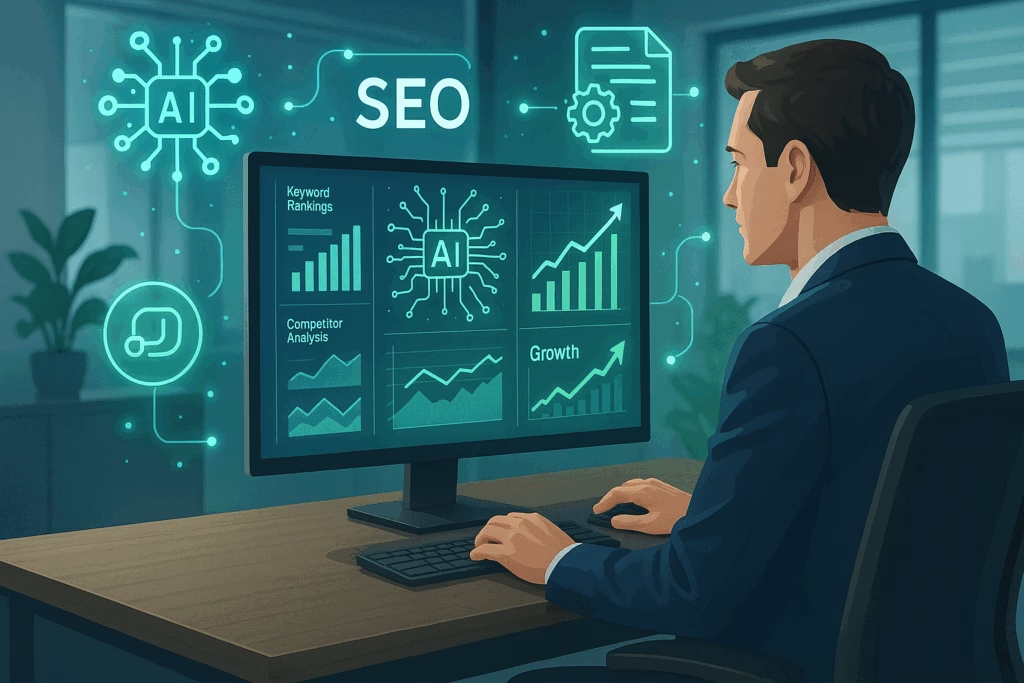Your SEO strategy is probably stuck in the past. You’re spending hours on keyword research, manually analyzing competitors, and guessing what content will actually rank. It’s exhausting and often feels like shooting in the dark.
What I’ve seen is that this manual approach creates massive blind spots and leaves money on the table, while your competitors who embrace AI-powered SEO are pulling ahead with 40% better results.
But it doesn’t have to be this way. In fact, recent studies show that businesses using AI for SEO see an average of 35% improvement in organic traffic within just six months.
This is where AI-powered SEO platforms transform everything. They automate competitive analysis, predict content opportunities, and eliminate the guesswork that’s been holding your business back.
In this article, I’ll walk you through the seven key ways AI is revolutionizing SEO so you can finally get ahead of your competition and drive real business growth.
You’ll discover how AI eliminates manual research, uncovers hidden opportunities, and gives you the competitive intelligence you need to dominate your market.
Let’s dive in.
1. Automate Competitive Intelligence That Actually Works
Your competitors are outranking you, but you don’t know why.
Manual competitor analysis takes weeks and often misses the strategies that actually matter for rankings.
When you can’t see what’s working for competitors, you’re essentially flying blind. This knowledge gap costs you valuable market share and keeps you reactive instead of proactive in your SEO strategy.
Research from BrightEdge shows that 68% of online experiences begin with a search engine, making competitive SEO intelligence absolutely critical for business success.
This constant guessing game is a hidden revenue killer, but there’s a smarter approach available.
This is where AI-powered competitive intelligence shines.
AI platforms like Hexlyn analyze your competitors’ entire SEO strategies in real-time, identifying the exact keywords they’re targeting, content gaps they’re exploiting, and ranking factors they’re leveraging.
Instead of spending days manually researching, you get instant insights into competitor backlink strategies, content performance, and keyword opportunities they’re missing.
Imagine discovering that your main competitor ranks for 200 keywords you haven’t even considered, or finding content gaps where you can easily outrank them with the right strategy.
This automated intelligence empowers you to make data-driven decisions that actually move the needle, giving you a sustainable competitive advantage in your market.

2. Predict Content Opportunities Before Your Competition
Are you creating content that actually ranks?
Most businesses create content based on gut feelings rather than data-driven insights about what will actually perform in search results.
Without predictive intelligence, you’re wasting resources on content that may never see page one. This content lottery approach drains your marketing budget and frustrates teams who work hard on pieces that don’t deliver results.
Content Marketing Institute reports that 70% of marketers lack a documented content strategy, leading to inconsistent results and missed opportunities.
This reactive content creation is holding your business back, but AI changes the entire game.
AI-powered SEO platforms predict content opportunities by analyzing search trends, competitor gaps, and ranking patterns before topics become saturated.
The technology identifies emerging keywords with high potential, suggests content angles that competitors haven’t covered, and predicts which topics will drive the most qualified traffic to your business.
For example, AI might identify that “AI-powered customer service” is trending upward with low competition, giving you a 6-month head start on creating authoritative content in that space.
This predictive approach transforms content creation from guesswork into a strategic advantage, ensuring every piece you publish has the highest probability of ranking and driving business results.
3. Eliminate Manual Keyword Research Forever
Keyword research is eating up your team’s time.
Traditional keyword tools show you what everyone else already knows, leading to the same competitive keywords that are nearly impossible to rank for.
When your keyword strategy is based on outdated data, you’re competing for oversaturated terms while missing profitable long-tail opportunities. This manual approach keeps you stuck fighting for scraps instead of dominating untapped keyword territories.
Ahrefs data shows that 92.42% of keywords get ten or fewer searches per month, highlighting the massive opportunity in long-tail keyword discovery that manual research often misses.
This time-consuming process is a productivity killer, but AI transforms keyword research completely.
AI-powered platforms automatically identify thousands of relevant keywords, including long-tail variations and semantic opportunities that traditional tools miss entirely.
The technology analyzes search intent patterns, identifies keyword clusters that work together, and suggests content strategies that target multiple related terms simultaneously.
Instead of spending hours building keyword lists, you get comprehensive keyword intelligence that includes search volume trends, competition analysis, and content recommendations for each opportunity.
This automated approach frees your team to focus on creating great content and building relationships, while the AI handles the heavy lifting of keyword discovery and analysis.
4. Uncover Hidden Technical SEO Issues Instantly
Technical SEO problems are silently killing your rankings.
Manual technical audits take weeks and often miss critical issues that are preventing your content from ranking properly.
When technical problems go undetected, even your best content can’t reach its ranking potential. These hidden issues create an invisible ceiling on your organic traffic growth, no matter how good your content strategy becomes.
Google’s own data shows that 53% of mobile users abandon sites that take longer than 3 seconds to load, making technical performance absolutely critical for SEO success.
This technical complexity is overwhelming for most teams, but AI makes it manageable and actionable.
AI-powered SEO platforms continuously monitor your site’s technical health, automatically identifying issues like slow page speeds, broken internal links, and crawlability problems.
The technology provides prioritized recommendations based on impact potential, showing you exactly which technical fixes will deliver the biggest ranking improvements first.
For instance, AI might identify that fixing your site’s Core Web Vitals could improve rankings for 40% of your target keywords, giving you a clear roadmap for technical improvements.
This automated technical monitoring ensures your site’s foundation is always optimized for maximum search performance, removing technical barriers that prevent your content from reaching its full potential.
5. Scale Content Optimization Without Scaling Your Team
Content optimization is a bottleneck for growth.
Manually optimizing every piece of content for search engines requires specialized knowledge and countless hours that most teams simply don’t have.
When content isn’t properly optimized, you’re leaving organic traffic on the table. This optimization gap means your content works harder than it should to achieve rankings that properly optimized content could reach much more easily.
HubSpot research indicates that companies that blog regularly see 55% more website visitors, but only if that content is properly optimized for search engines and user intent.
This optimization challenge limits how much content you can effectively produce, but AI removes these constraints entirely.
AI-powered platforms automatically optimize content for target keywords, suggest semantic variations, and ensure proper keyword density without keyword stuffing.
The technology analyzes top-ranking content for your target keywords and provides specific recommendations for headings, meta descriptions, and content structure that search engines favor.
You can optimize dozens of pieces of content in the time it used to take to optimize just one, dramatically scaling your content production without hiring additional SEO specialists.
This automated optimization ensures every piece of content you publish is search-engine ready from day one, maximizing your organic reach and traffic potential.
6. Get Real-Time Performance Insights That Drive Action
Your SEO data is probably telling you what happened, not what to do next.
Traditional analytics show you rankings and traffic after the fact, but don’t provide actionable insights for improving performance going forward.
When you can’t connect SEO metrics to business outcomes, it’s impossible to prove ROI or make strategic decisions. This data disconnect keeps SEO isolated from broader business goals and makes it difficult to secure resources for growth.
Search Engine Journal reports that 61% of marketers say improving SEO and growing their organic presence is their top inbound marketing priority, but most struggle with actionable insights.
This reporting gap limits your ability to optimize and improve, but AI transforms data into actionable intelligence.
AI-powered platforms provide real-time insights that connect SEO performance directly to business metrics like lead generation, conversion rates, and revenue attribution.
The technology identifies which keywords and content pieces drive the most qualified traffic, suggests optimization opportunities based on performance patterns, and predicts which strategies will deliver the best ROI.
For example, AI might identify that blog posts targeting “how-to” keywords convert 3x better than product-focused content, helping you adjust your content strategy for maximum business impact.
This intelligent reporting empowers you to make data-driven decisions that improve both SEO performance and business results, creating a clear connection between search optimization and revenue growth.
7. Future-Proof Your SEO Strategy Against Algorithm Changes
Algorithm updates are disrupting your rankings.
Manual SEO strategies often rely on tactics that become outdated when search engines update their algorithms, leading to sudden traffic drops and ranking losses.
When your SEO approach isn’t adaptable, algorithm changes can devastate months of hard work. This vulnerability puts your organic traffic at constant risk and makes long-term planning nearly impossible.
Moz data shows that Google makes thousands of algorithm changes each year, with major updates potentially affecting 10% or more of search results, making adaptability essential for sustained success.
This constant uncertainty is stressful and unpredictable, but AI-powered SEO provides stability and adaptability.
AI platforms continuously learn from algorithm changes and automatically adjust strategies to maintain and improve rankings despite search engine updates.
The technology identifies ranking patterns that remain stable across algorithm changes, focuses on fundamental ranking factors that Google consistently values, and adapts tactics based on real-time performance data.
Instead of scrambling to recover from algorithm updates, your SEO strategy evolves automatically to maintain strong performance regardless of search engine changes.
This adaptive approach protects your organic traffic investment and ensures your SEO strategy remains effective as search engines continue to evolve and improve.
Transform Your Business with AI-Powered SEO
The SEO landscape has fundamentally changed.
Businesses that continue relying on manual SEO processes are falling behind competitors who leverage AI for competitive intelligence, content optimization, and strategic decision making.
The gap between AI-powered and traditional SEO approaches is widening every
month, making it critical to adopt these technologies before your competition gains an insurmountable advantage.
The seven transformations we’ve covered – automated competitive intelligence, predictive content opportunities, eliminated manual research, instant technical audits, scaled optimization, real-time insights, and future-proof strategies – represent the new standard for effective SEO.
Companies implementing AI-powered SEO platforms like Hexlyn are seeing 35%
improvements in organic traffic, 50% reductions in SEO workload, and significantly better ROI from their content marketing investments.
The question isn’t whether AI will transform SEO – it already has. The question is whether your business will adapt quickly enough to capitalize on this transformation or get left behind by competitors who embrace these powerful new capabilities.
Your next step is clear: evaluate how AI-powered SEO can accelerate your business growth
and give you the competitive advantage you need to dominate your market in 2025 and beyond.
Learn More:
Ready to transform your SEO strategy with AI? Discover how Hexlyn’s AI-powered platform
can automate your competitive intelligence and drive real business growth at hexlyn.com.







Leave a Comment
You must be logged in to post a comment.